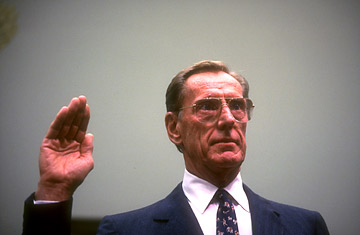
Financier Charles Keating being sworn in, before refusal to testify, during House Banking Comm. hearing on failure of his Lincoln Savings & Loan Assoc.
The Obama campaign's release of the online video "Keating Economics: John McCain and the Making of a Financial Crisis" on Oct. 6th was the latest punch in an exchange of heated attacks between the two presidential candidates.
The 13-minute web documentary, featured on the home page of Obama's website, highlights McCain's involvement in attempts to rescue the California-based Lincoln Savings and Loan Association, chaired by political donor Charles Keating, jr, during the spectacular collapse of the U.S. savings and loan industry in the 1980s and early 1990s.
Following the deregulation of savings and loan associations (S&Ls) in the early 1980's, several of these banks began taking greater liberties with depositors' money, sinking it into risky real estate ventures and junk bonds in an effort to reap maximum profits. Fearful about the future of the vast amounts of federally-insured money being invested, the Federal Home Loan Bank Board (FHLBB) instituted a cap on the amount of money S&L's were allowed to place in such volatile instruments. An investigation into Lincoln Savings and Loan uncovered flagrant violations of these regulations, exceeding the limit by over $615 million.
But before any measures could be taken against the company, five Senators came calling at the FHLBB, requesting that the charges against Lincoln not be pursued, on the basis that the S&L was a major employer in their states. These Senators — McCain , John Glenn (D-OH), Alan Cranston (D-CA), Donald Riegle (D-MI) and Dennis DeConcini (D-AZ) — had little in common. Most of them came from different states and different parts of the political spectrum. One of the only elements that linked the men together was Charles Keating. The banker had been a major contributor to each of their campaigns, donating close to $1.4 million dollars total. Keating also considered John McCain to be a close personal friend, with whom he'd shared vacations and business ventures.
Their pleas bought Lincoln more time, but the company was ultimately seized by the FHLBB two years later. Its bailout cost taxpayers over $3 billion; thousands of Lincoln investors lost their life savings.
The magnitude of Lincoln's collapse and the fraud charges later brought against Keating led the Senate Ethics Committee to launch an investigation into the conduct of the five Senators — now known as the Keating Five — who were thought to have improperly intervened with regulators to protect a campaign contributor. The investigation began in November of 1989 and lasted nearly two years. All five Senators denied improper conduct, claiming that it was Keating's status as a constituent rather than as a donor that motivated their actions; although when Keating was asked whether his financial support had influenced the Senators on his behalf, he responded "I want to say in the most forceful way I can: I hope so."
Keating himself was convicted on 73 counts of fraud in 1993 and served 4 years in prison. Though the Keating Five emerged from the scandal legally unscathed — only Cranston received a formal reprimand — the political consequences have had more lasting effects. Cranston left office, while both Riegle and DeConcini opted out of running for re-election. McCain, for his part, has referred to his involvement in the affair as "the worst mistake of my life."
